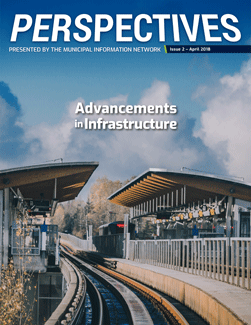Canadians spent an average of 26.2 minutes travelling to work in 2016 – the longest commutes on record – and a greater proportion of commuters took public transit than ever before, according to a Statistics Canada report released last year. With commute times getting longer and longer each year, and with Canadian cities growing faster than ever, now is the time to double down on the role of public transit in managing congestion in our cities.
We know congestion isn't going away, which is why we need to ask ourselves what the most strategic, data-driven response is to improving our commute times. Widening roads is rarely the answer because research shows that these will simply fill up with more cars the day they open. While not everyone will choose to commute via public transit, enabling transit as a real alternative is the most significant way to deal with congestion. Now is the time to start building for the future.
Canada's Big City Mayors Caucus (alongside FCM) pushed for a more stable, predictable funding model for city building – including transit and affordable housing. Federally, our advocacy on behalf of big cities is paying off. In Budget 2017 the federal government made significant commitments to long-term investments in municipalities. The way I see it, this 11-year, $180 billion "Investing in Canada" Infrastructure plan is an historic opportunity to transform our cities nationwide.
To turn this opportunity into real outcomes for Canadians, however, we need smart program design that empowers municipalities to move projects forward. So much of this comes down to the bilateral negotiations between the federal government and provinces and territories.
The agreements to date are designed to give cities real tools to turn this opportunity into outcomes including better roads and transit, emission reductions, and more. Almost as importantly, these agreements are a ground-breaking recognition of the critical role local governments' play in nation-building.
As these negotiations are wrapping up and announcements are being made, Canada's Big City Mayors are watching closely, as we have been advocating for meaningful provincial cost-sharing and clear commitments to support a fair balance of municipal and provincial projects.
For instance, we pushed for a minimum 40% provincial cost-share on major municipal transit projects and in some provinces (B.C), we've seen agreements to this effect. This is a major improvement over the traditional one-third-each model, which doesn't account for the fact that municipalities already cover 100% of the operating and maintenance costs of major transit.
Here in Alberta, our provincial government commitment has only to a one-third cost share for municipal projects (including transit), albeit that is a minimum. We continue to press for the provinces to go further, and we consider this to be the beginning of the conversation with the Government of Alberta as they design their bold new Provincial Transit Investment Plan.
Our discussions with the province over the next few months will be critical in developing a plan that addresses the concerns citizens have around congestion and commuting (we know these concerns are real see #yegcommute). If we get this Plan right, it could be transformational for the Edmonton Metro Region – and for Alberta.
I know that this is a difficult time and both the provincial and federal governments are working to manage large deficits and less revenue. But to grow the economy and improve provincial and federal bottoms lines, we need to invest boldly. Having a high performing transit service supports increased productivity, alleviates traffic congestion, advances our shared environmental goals and stimulates economic activity. For instance, expanding Edmonton's LRT network West will create over 8,000 jobs, spur an estimated $760 million in wages and give tens of thousands of people a more reliable commute.
Public transit is necessary for economic growth and has a substantial positive impact on the economy of a region.
As more and more Canadians move to our cities and city-regions looking for new opportunities, it is critical that both the federal and provincial governments stay committed to the evolving role of Canada's big cities in our country's economic prosperity.








